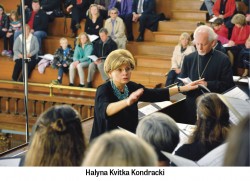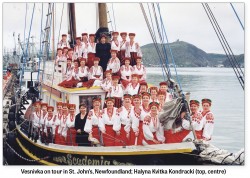 It’s Tuesday evening and Vesnivka is rehearsing for an upcoming concert – perhaps the most important in the Toronto choir’s history.
It’s Tuesday evening and Vesnivka is rehearsing for an upcoming concert – perhaps the most important in the Toronto choir’s history.
It’s been 50 years since conductor and artistic director Halyna Kvitka Kondracki founded Vesnivka and the Ukrainian women’s choir is preparing for its golden anniversary performance. This month’s concert at Glenn Gould Studio April 17 features the works of contemporary composers commissioned by Vesnivka over the past five decades.
I’m excited to sit in on a rehearsal and race across Trinity Bellwoods Park before making my way down the stairs into the basement of St. Nicholas Ukrainian School where Vesnivka has practised since day one. As I enter the hall, the memories begin flooding in.
I was one of the young girls who attended Saturday school at St. Nick’s where Kondracki established Vesnivka in 1965. From humble beginnings as an after-school music program to an internationally acclaimed choir renowned for musical excellence, Vesnivka has become a leading voice of Ukrainian choral music worldwide, transcending language barriers and entertaining diverse audiences at home and abroad.
I was 13 when I joined Vesnivka; I sang in the alto section for more than 30 years. During that time, the choir performed across Canada, the eastern United States, South America, Europe and Great Britain on some of the most prestigious concert stages in the world. Singing at Carnegie Hall in New York City, the Royal Albert Hall in London and at a Papal mass next to the magnificent Renaissance altar at St. Peter’s Basilica in Rome were unforgettable experiences that came with bragging rights.
A whirlwind seven-city tour of Ukraine in 1991 was life-changing. From as far back as I remember, my parents had talked about their beloved homeland and I soaked up its history and culture vicariously. Stepping onto Ukrainian soil for the first time and walking in the footsteps of my ancestors was almost surreal. I discovered where I’d come from and who I was.
The experience was unmatched and I was thrilled to share it with my choir sisters. We embraced our heritage and the people who opened their hearts to us. At times we were so moved by their generosity of spirit, we cried on stage.
There were also tears of joy. Travelling across that vast country on a bus with 50 of my best friends was so much fun. We’d spontaneously break out in song or laugh our heads off after someone grabbed the microphone to tell jokes over the public address system, all the while sharing goodies like cake, home-baked bread and roast chicken that had been passed on by relatives after a concert. As the miles rolled on, we’d chat and get to know one another better. Each tour – across Canada, France, Germany, Spain, Portugal, Argentina, Brazil, Holland, Poland and so many others – made our musical family stronger.
For Myroslava Diakun, Vesnivka nourished her passion for singing. “I grew up in a family that loved music and special occasions at our house always included singing, usually in three-part harmony,” she tells me. “Fast forward 50 years and I’m still singing in Vesnivka with lifelong friends that I met in the choir who have become my extended family.”
And the songs that brought us together in our youth keep us connected in adulthood. When “the girls” get together for birthdays, weddings of our children, christenings and even celebrations of lives lived, we sing. I join in from the pews when Vesnivka sings the liturgy at St. Nicholas Ukrainian Catholic Church on Queen St. West.
When I’m feeling nostalgic, I pull out my collection of Vesnivka’s recordings. This latest release, 50 Seasons of Song, is a compilation of the “best recordings” of Vesnivka in celebration of the 50th anniversary. The songs from the early years feature a pure and clean sound with orchestral arrangements by Canadian composer and two-time Gemini Award-winner Eric Robertson. There are songs that celebrate the strength and spirit of Ukrainian women as well as compositions by I.B. Vesolowskyj, featuring his popular dance songs of the 40s and 50s with Vesnivka accompanied by Toronto’s Burya Band.
Fittingly in this anniversary year, last month, Vesnivka launched the first phase of its e-Library of Ukrainian Choral Music. The project represents a significant milestone for Vesnivka in its mandate of promoting Ukrainian choral music, says e-Library manager and longtime Vesnivka member Lesia Komorowsky. “Vesnivka has an impressive repertoire of Ukrainian classical, folk, contemporary and sacred music in its archives which it wants to share with singers around the world – thus leaving a musical legacy for generations to come.”
The e-Library gives users access to this music online, the ability to download the sheet music in either the original Ukrainian or transliterated form for performance. Music lovers can explore it at vesnivka.com and clicking on the e-Library link.
 While I haven’t been in the choir for many years, it feels as if I’ve never left as I walk into the room where old friends welcome me. “Does this mean you’re coming back to the choir?” they ask before I take a seat in the back row and wait for the rehearsal to begin.
While I haven’t been in the choir for many years, it feels as if I’ve never left as I walk into the room where old friends welcome me. “Does this mean you’re coming back to the choir?” they ask before I take a seat in the back row and wait for the rehearsal to begin.
Aside from the padded chairs and music stands, little has changed in the hall. It’s still buzzing with energy as it always did before a concert.
While there are many new faces, there are also familiar ones. Olenka Wasley, the longest-standing member of the choir, joined in 1965 and hasn’t missed a season yet. “Quite often commitments such as school, work, family responsibilities or health matters have affected the membership of many, but I pride myself on being able to manage all of these and still be an active member,” she says.
Wasley recalls being impressed by Kondracki’s enthusiasm, creativity and dedication. That hasn’t changed either.
“We all marvelled at her talents,” Wasley tells me, adding that Vesnivka has been a big part of her life and that of her family which has supported her every step of the way, knowing how much she loves singing in the choir. “I would encourage young women to come out and join Vesnivka and celebrate music through song,” she says.
I’m hoping The Nightingale, (arrangement by Borys Lystopad based on a traditional Ukrainian folk song), will be part of the evening’s practice. Its haunting melody, sung a cappella, transports me to Llangollen, Wales and the 1993 International Eisteddfodd as the judges announce that Vesnivka’s performance of The Nightingale placed first in the folk category at the prestigious choral competition. I remember leaping out of my seat and jumping for joy. It’s how athletes must feel winning Olympic gold.
While I loved the concerts, participation in music festivals and competitions opened up the world of international choral music and opportunities to meet people who love to sing as much as I do.
It was also amazing to bring home the awards – whether it was from a CBC Choral Competition or the Choral Olympics in Linz, Austria. Not bad for amateurs.
As the choir warms up, I slip into the adjoining music room where the walls are covered with photographs, concert posters, certificates, awards and mementos. They tell the story of Vesnivka’s history beginning with Kondracki who was studying at the University of Toronto’s Faculty of Music when she established Vesnivka to share her rich musical heritage. It wasn’t easy and some said a youth choir wouldn’t last. Tenacious and determined, Kondracki would prove them wrong.
Encouraged by her father Bohdan Zorych, who had conducted his own choir in Ukraine, Kondracki was inspired by the beautiful music she sang growing up.
“There is nothing to compare to the pure joy of singing – of using that fabulous instrument within us to express our passion for life and love of our Ukrainian culture,” she says. “This gift is a treasure that gains greater value when shared with others.”
Back in the 60s, few had heard of Ukraine or knew that Mykola Leontovych, who composed the internationally renowned Carol of the Bells, was Ukrainian. Over the years, Vesnivka has helped put Ukrainian choral music on the map attracting culturally diverse audiences.
Even a lack of Ukrainian music for girls’ voices didn’t keep her from her métier. When she couldn’t find suitable music, Kondracki rewrote arrangements from male choir TB scores to SSA. In 1968, she commissioned Ukrainian composer Andrij Hnatyshyn, living in Austria, to write an Eastern Rite Byzantine mass for Vesnivka in three- and four-part harmony which is the foundation of the choir’s sacred repertoire. Some sections are still part of the liturgy the choir sings at St. Nicholas. Kondracki also searched archives in Ukraine for original folk songs and classical music expanding Vesnivka’s repertoire. She made connections with contemporary composers there and at home and continues to commission new works to broaden Vesnivka’s musical horizons bringing new music to audiences and showcasing talented composers.
“Vesnivka owes a great deal of its success to the incredible talent and creativity of composers who have given us such wonderful works to perform over the years,” says Kondracki.
Ukrainian-Canadian composers such as Roman Hurko, whose Liturgy No.4 (Vesnivka) launched the choir’s anniversary season last fall, as well as Zenia Kushpeta, Larysa Kuzmenko and Zenoby Lawryshyn will be featured at this month’s concert.
Kondracki continues to blaze new trails for Vesnivka by collaborating with ensembles such as the Elmer Iseler Singers, conducted by Lydia Adams, the Toronto Ukrainian Male Chamber Choir, Roman Borys, cellist with the Gryphon Trio, and violinist Halyna Dziuryn – guest artists at the gala concert.
Looking ahead, Vesnivka has been invited to the Ottawa International Chamber Music Festival this summer. Next year, Vesnivka will be on stage at Koerner Hall with Orpheus Choir of Toronto as well as other artists and musicians for a marquee concert celebrating Canada’s 150th birthday and the 125th anniversary of Ukrainian settlement in Canada. It will showcase the works of Canadian composers John Estacio (The Houses Stand Not Far Apart) and Larysa Kuzmenko (The Golden Harvest).
When Robert Cooper, artistic director of Chorus Niagara and Orpheus Choir of Toronto, took on the project, Kondracki was the first person he called. They were introduced back in the 80s while Cooper was a producer of choral music at the CBC Radio and headed up the national choral competitions. “Vesnivka always won,” (in the multicultural category) says Cooper who is also artistic director of Opera in Concert Chorus and Ontario Male Chorus. Cooper worked with Kondracki in 2006 when Vesnivka joined more than 250 Canadian singers and musicians onstage at Roy Thomson Hall for “Chernobyl 20,” commemorating the 1986 Chernobyl nuclear reactor disaster in Ukraine.
“I’m very aware of Kvitka’s good work,” Cooper continues noting under Kondracki’s leadership that Vesnivka has maintained “a very high order of choral sophistication…I enjoy working with Kvitka who is very authentic, very serious about her music, is an expert when it comes to Ukrainian choral music and makes things happen.”
While the future is exciting, the focus this evening is on the 50th anniversary program. I settle into my seat as Kondracki raises her arms and Vesnivka begins to rehearse. The room fills with the glorious sound of music. I close my eyes and let my spirit soar.
Leslie Ferenc is a member of the Vesnivka 50th anniversary committee.



